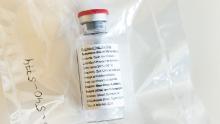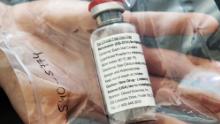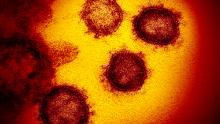[ad_1]
“The data shows that remdesivir has a clear-cut, significant, positive effect in diminishing the time to recovery,” said the institute’s director, Dr. Anthony Fauci.
Results from the preliminary trial show remdesivir improved recovery time for coronavirus patients from 15 to 11 days.
“Although a 31% improvement doesn’t seem like a knockout 100%, it is very important proof of concept,” Fauci said. “What it has proven is that a drug can block this virus.”
“Results also suggested a survival benefit, with a mortality rate of 8.0% for the group receiving remdesivir versus 11.6% for the placebo group,” the NIAID said.
Normally, data about a drug’s efficacy wouldn’t be released this early from a preliminary trial.
But “whenever you have clear-cut evidence that a drug works, you have an ethical obligation to immediately let the people in the placebo group know so that they can have access,” Fauci said.
The US Food and Drug Administration has not yet approved any drugs for the treatment of the coronavirus.
But the FDA plans to announce an emergency-use authorization for remdesivir, according to The New York Times. The authorization could come as soon as Wednesday, the Times reported, citing a senior administration official.
In a statement to CNN, the FDA said it is in talks with Gilead Sciences, the maker of remdesivir, about making the drug available to patients.
“As part of the FDA’s commitment to expediting the development and availability of potential COVID-19 treatments, the agency has been engaged in … discussions with Gilead Sciences regarding making remdesivir available to patients as quickly as possible, as appropriate,” FDA spokesman Michael Felberbaum said in statement.
The remdesivir trial marks the first clinical trial launched in the US to evaluate an experimental treatment for Covid-19.
About 1,090 people participated in the trial internationally, Fauci said, calling it “the first truly high-powered randomized placebo controlled trial.”
But the World Health Organization said it’s too early to comment on the remdesivir trial results released Wednesday.
“Typically, you don’t have one study that will come out that will be a game changer,” said Dr. Maria Van Kerkhove, the WHO’s technical lead for the coronavirus response.
She said the agency generally pulls together evidence from several studies before reviewing and critiquing the evidence.
“It can sometimes take a number of publications to determine (what) the ultimate impact of a drug is,” said Dr. Mike Ryan, executive director of the WHO’s health emergencies program.
CNN’s Amanda Watts, Maggie Fox, Arman Azad, Sara Murray and Gisela Crespo contributed to this report.




















